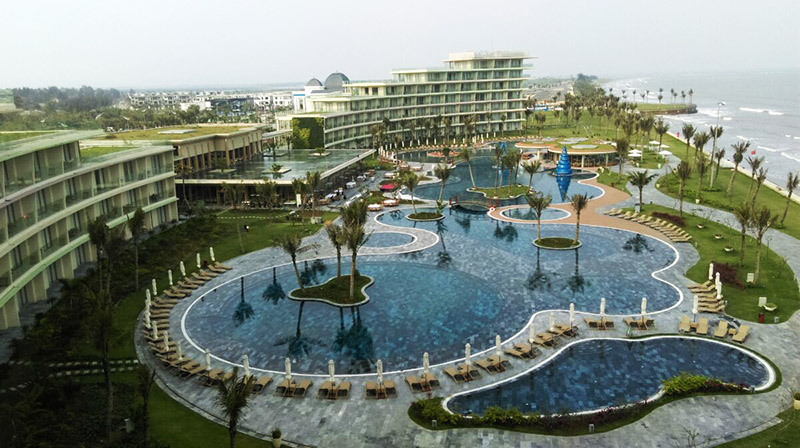Maersk rolls out electric trucks for inland transport in Vietnam
A.P. Moller–Maersk will deploy a fleet of heavy-duty electric trucks for inland container transport in Vietnam starting in the first quarter of 2026.




Bamboo Airways may pose a risk of competition with Vietnam Airlines or Vietjet Air; however, this prospect will only happen as early as 2019.
Recently, Bamboo Airways has signed a Memorandum of Understanding (MOU) with the Airbus Group for the purchase of 24 A321 neo aircraft. It is expected that these aircraft will be delivered from 2019 to 2025. This is surprising news since Bamboo Airways has not been granted business license yet.
"The fact that Bamboo Airways entered the contract with Airbus shows the airline’s confidence that it will receive the license by the end of next year," according to a report from Ho Chi Minh City Securities Company (HSC).
Bamboo Airways is owned by Viet Bamboo Airlines Company Limited. Viet Bamboo Airlines, a subsidiary of FLC Group, was established in 2017 with charter capital of VND700 billion (US$30.7 million).
Bamboo Airways has applied for the business license since June 2017 but has not received the approval yet.
Founding an airline is under the development plan of FLC’s chairman Trinh Van Quyet. Currently, with a network of resorts and tourism complexes located in many coastal provinces, FLC needs its own private airline to ensure the flights to its resorts. The initial strategy of Bamboo Airways, therefore, will focus on opening both domestic and international flights to cities and provinces of Quy Nhon, Quang Ninh, Hai Phong, Thanh Hoa and Nha Trang.
The establishment of Bamboo Airways not only supports the resort business but also expresses FLC Group’s huge ambition.
Currently, the domestic aviation industry has an average annual growth rate of 17 per cent, the highest rate in the region, but there are only three airlines including Vietnam Airlines, Vietjet Air and Jetstar Pacific operating in the country. In particular, Vietnam Airlines leads the aviation industry with a 43 per cent market share, followed by Vietjet Air with 42 per cent.

Vietjet Air, with its low-cost strategy, broke Vietnam Airlines' monopoly and became a major carrier in less than 10 years. The success of Vietjet and the huge market are two factors strengthening the ambition of Bamboo Airways. If the strategy is right, Trinh Van Quyet’s airline can completely occupy a considerable part of market share.
"It is likely that this move in long-term will create competition risks for existing airlines such as Vietnam Airlines and Vietjet Air. However, this risk in the medium term is not impactful," HSC said. By 2025, Bamboo Airways could capture 4.2 per cent of the domestic aviation market share and 1.6 per cent of the global aviation market share.
Bamboo Airways is set to become the "hybrid" airline, combining low-cost aviation and traditional aviation. The A321neo, the aircraft that Bamboo Airways has ordered 24 from Airbus, is Airbus's largest member of A320 family. This is also the ideal aircraft for the "hybrid" strategy of Bamboo Airways.
Despite being confident in signing a contract with Airbus, the future of Bamboo Airways is quite risky.
Even in the case of receiving the business license and all plans on the right track, due to overload at airports such as Tan Son Nhat, it is unclear how Bamboo will look for the parking lot. That is not to say, as a newbie, the competition for the ideal time to take off and land at Noi Bai or Tan Son Nhat airports is also a problem.
On March 25, Japanese low-cost airline Vanilla Air officially announced its entire cancellation of services in Vietnam despite its commencement of optimistic business performance over the past 18 months due to failure with local competitors.
The announcement came just three days after ANA Holding announced Vanilla Air’s merger with another low-cost carrier, Peach Aviation. ANA Holding is the parent company of both airlines and is a member of ANA Group, the largest aviation corporation in Japan.
A.P. Moller–Maersk will deploy a fleet of heavy-duty electric trucks for inland container transport in Vietnam starting in the first quarter of 2026.
The partnership aims to expand the system of charging and battery swapping stations, providing Grab driver-partners and other EV users with easy access to flexible and reliable charging solutions.
Samsung Vietnam appoints Nguyen Hoang Giang to SEVT senior leadership, the first Vietnamese executive in the company’s local manufacturing units.
Michelin is undergoing a strong transformation by applying AI and smart analytic, helping lead the smart, safe, and sustainable mobility revolution in the Industry 4.0 era.
LG Innotek Vietnam Hai Phong secured a $200 million IFC loan as revenue slows, aiming to expand camera module production while meeting sustainability targets.
For Koen Soenens, Sales and Marketing Director at DEEP C, empathy is a compass that guides major deals, the way a leader builds a team, and the ambition to create a sustainable industrial zone that carries a Vietnamese identity.